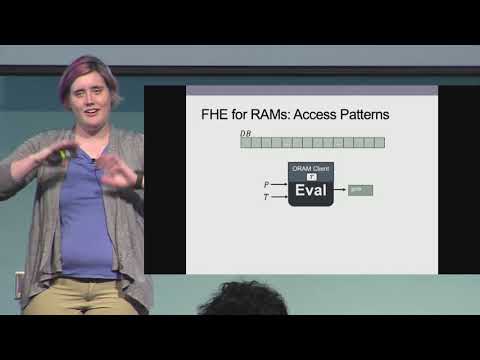CryptoDB
On the Plausibility of Fully Homomorphic Encryption for RAMs
| Authors: | |
|---|---|
| Download: |
|
| Abstract: | We initiate the study of fully homomorphic encryption for RAMs (RAM-FHE). This is a public-key encryption scheme where, given an encryption of a large database D, anybody can efficiently compute an encryption of P(D) for an arbitrary RAM program P. The running time over the encrypted data should be as close as possible to the worst case running time of P, which may be sub-linear in the data size.A central difficulty in constructing a RAM-FHE scheme is hiding the sequence of memory addresses accessed by P. This is particularly problematic because an adversary may homomorphically evaluate many programs over the same ciphertext, therefore effectively “rewinding” any mechanism for making memory accesses oblivious.We identify a necessary prerequisite towards constructing RAM-FHE that we call rewindable oblivious RAM (rewindable ORAM), which provides security even in this strong adversarial setting. We show how to construct rewindable ORAM using symmetric-key doubly efficient PIR (SK-DEPIR) (Canetti-Holmgren-Richelson, Boyle-Ishai-Pass-Wootters: TCC ’17). We then show how to use rewindable ORAM, along with virtual black-box (VBB) obfuscation for specific circuits, to construct RAM-FHE. The latter primitive can be heuristically instantiated using existing indistinguishability obfuscation candidates. Overall, we obtain a RAM-FHE scheme where the multiplicative overhead in running time is polylogarithmic in the database size N. Our basic scheme is single-hop, but we also extend it to obtain multi-hop RAM-FHE with overhead $$N^\epsilon $$ for arbitrarily small $$\epsilon >0$$ .We view our work as the first evidence that RAM-FHE is likely to exist. |
Video from CRYPTO 2019
BibTeX
@article{crypto-2019-29874,
title={On the Plausibility of Fully Homomorphic Encryption for RAMs},
booktitle={Advances in Cryptology – CRYPTO 2019},
series={Lecture Notes in Computer Science},
publisher={Springer},
volume={11692},
pages={589-619},
doi={10.1007/978-3-030-26948-7_21},
author={Ariel Hamlin and Justin Holmgren and Mor Weiss and Daniel Wichs},
year=2019
}

